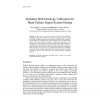442 search results - page 25 / 89 » Knowledge Representation Using High-Level Non-monotonic Reas... |
166
Voted
LPAR
1999
Springer
15 years 6 months ago
1999
Springer
Abstract. Description Logics (DLs) are a family of knowledge representation formalisms mainly characterised by constructors to build complex concepts and roles from atomic ones. Ex...
100
click to vote
AAAI
1993
15 years 3 months ago
1993
Formal AI systems traditionally represent knowledge using logical formulas. We will show, however, that for certain kinds of information, a modelbased representation is more compa...
145
Voted
ILP
2007
Springer
15 years 8 months ago
2007
Springer
In this chapter, we describe a view of statistical learning in the inductive logic programming setting based on kernel methods. The relational representation of data and background...
127
Voted
IEAAIE
1995
Springer
15 years 6 months ago
1995
Springer
High level Petri Nets have recently been used for many AI applications, particularly for modelling traditional rule-based expert systems. The major effect is to facilitate the ana...
123
click to vote
MIE
2008
15 years 4 months ago
2008
In this work we present the usage of semantic web knowledge representation formalism (OWL) in combination with general purpose reasoning for building a medical expert system. The a...

